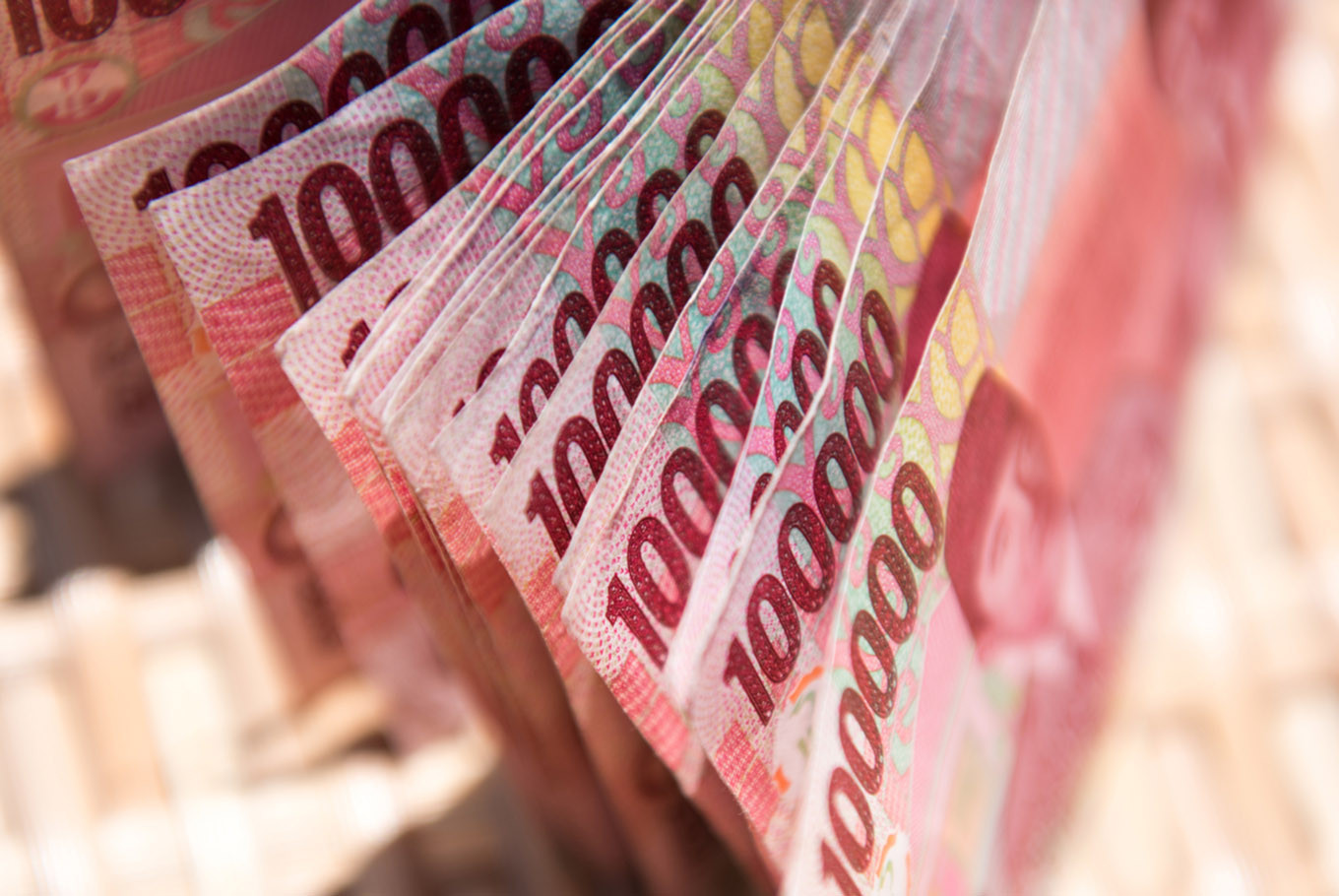Rupiah inches closer to Rp 17,000 per US dollar as COVID-19 fears grow
Analysts believe it will take time for the currency to return to the level of between 13,800 and 14,000 per dollar recorded in February.
Change Size
 The rupiah gained slightly against the US dollar on Tuesday but still hovered at around 16,500 per dollar. (Shutterstock.com/Maciej Matlak)
The rupiah gained slightly against the US dollar on Tuesday but still hovered at around 16,500 per dollar. (Shutterstock.com/Maciej Matlak)
T
he rupiah fluctuated at around 16,500 per US dollar on Tuesday despite a slight gain after falling sharply to near the 17,000-mark the previous day.
The rupiah inched closer to Rp 17,000 against the dollar on Monday, the weakest since the 1998 crisis, as analysts believe it will further weaken amid the COVID-19 pandemic, despite strong economic fundamentals.
According to Bloomberg’s latest currency data, the rupiah gained slightly to 16,495 per dollar on the spot market on Tuesday but analysts believe it will take time for the currency to return to the level of between 13,800 and 14,000 per dollar recorded in February.
Futures firm RFX Garuda Berjangka director Ibrahim said COVID-19 had crippled the global economy, which prompted investors to dump emerging market currencies, adding that the only solution would be the discovery of a vaccine.
“Investors consider the coronavirus to be the third world war, which could cause the rupiah to surpass 17,000 per dollar,” Ibrahim told reporters. “They are panicked as governments implement stricter measures, which have disrupted businesses and pushed consumers to stay home.”
The rupiah tumbled 3.85 percent against the dollar to trade at 16,575 at Monday’s close. It reached Rp 16,625 during the day, the lowest level since the 1998 crisis, as the currency weakened almost 20 percent against the greenback this year.
Meanwhile, the benchmark stock index, the Jakarta Composite Index (JCI), has lost a third of its value this year.
The benchmark JCI, the main gauge at the Indonesia Stock Exchange (IDX), fell another 1 percent on Tuesday to 3,951 after losing 5 percent on Monday, the lowest level since June 2012. The benchmark index has lost 36 percent of its value since the beginning of the year.
Ibrahim said the flagging rupiah was caused by the late response of the government in handling the outbreak, urging central government and regional administrations to work together to contain the outbreak and roll out further stimulus for the healthcare sector.
Separately, Bank Permata chief economist Josua Pardede said that while currencies in emerging markets, including the rupiah, had weakened against the dollar, economic fundamentals were much better compared to the 1998 crisis.
“Even though the rupiah almost reached the 1998 crisis level, the current depreciation rate of 19 percent year-to-date is much lower compared to the depreciation rate of 600 percent during the 1998 the crisis,” Josua told The Jakarta Post. “This means that Indonesia’s economic fundamentals are much stronger compared to the situation in 1998.”
There were several reasons why economic fundamentals remained strong, Josua went on to say, including better management of corporate debts and better credit ratings compared to 1998.
“The central bank’s decision to oblige companies to transact in safe-haven assets in mitigating risks from foreign exchange has resulted in better management of external corporate debts, as shown in lower growth of short-term debt,” Josua said.
From the credit rating perspective, meanwhile, Indonesia had junk bond status in 1998, as the government borrowed money with high premiums, Josua said.
“Indonesia’s credit rating is considered worth to invest in by all credit rating agencies worldwide right now. This further shows that they have confidence in Indonesia’s economic performance.”
With the rupiah sliding over the last few weeks, Bank Indonesia (BI) has injected Rp 300 trillion (US$18 billion) into the market through the purchase of sovereign bonds, supply of dollars in the spot market and intervention in domestic non-deliverables forward.
“The country’s foreign exchange reserves are adequate to meet dollar liquidity,” said BI Governor Perry Warjiyo on Friday. Indonesia’s central bank has begun holding daily repurchase and foreign exchange swap auctions to bolster liquidity.
It also cut the benchmark interest rate to 4.5 percent on Thursday following the central bank’s board of governors meeting.









